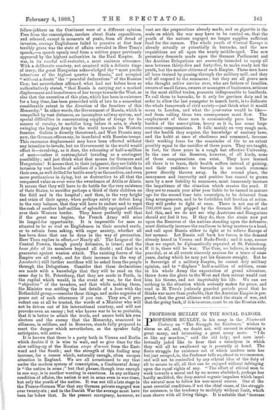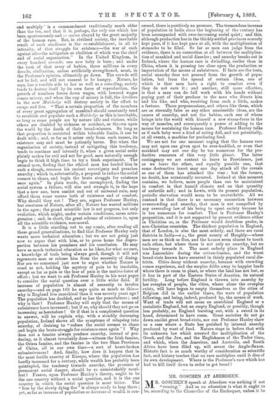PROFESSOR HUXLEY ON THE SOCIAL DANGER.
pROFESSOR HUXLEY, in his essay in the Nineteenth Century on "The Struggle for Existence," wishes to alarm us all, and, we doubt not, will succeed in alarming a great many, and interesting a great many more. "I do so like my murders," said the old lady; and men intel- lectually jaded like to hear that a cataclysm in which they will all be swallowed up is presently at hand. The fierce struggle for existence out of which modern man has but just escaped, is, the Professor tells us, about to recommence, and will not be controlled by any ethical idea of the duty of all to secure to all, all that can be enjoyed without infringing upon the equal rights of any. "The effort of ethical man to work towards a moral end by no means abolished, perhaps has hardly modified, the deep-seated organic impulses which impel the natural man to follow his non-moral course. One of the most essential conditions, if not the chief cause, of the struggle for existence, is the tendency to multiply without limit, which man shares with all living things. It is notable that 'increase and multiply' is a commandment traditionally much older than the ten, and that it is, perhaps, the only one which has been spontaneously and ex aninw obeyed by the great majority of the human race. But, in civilised society, the inevitable result of such obedience is the re-establishment, in all its intensity, of that struggle for existence—the war of each against all—the mitigation or abolition of which was the chief end of social organisation." In the United Kingdom, in every hundred seconds, one new baby is born ; and under the rush of that army of babies, three millions in every decade, civilisation, unless artificially strengthened, must, in the Professor's opinion, ultimately go down. The crowds will not be fed, and will not consent to be hungry. Nature, he says, has a terrible side to her as well as a consoling, society tends to destroy itself by its own force of reproduction, the growth of numbers forces down wages, with lowered wages comes misery, and when the cup of misery is full, the dwellers in the new 'llalebolge will destroy society in the effort to escape and live. "That a certain proportion of the members of every great aggregation of mankind should constantly tend to establish and populate such a Malebolge as this is inevitable, so long as some people are by nature idle and vicious, while others are disabled by sickness or accident, or thrown upon the world by the death of their bread-winners. So long as that proportion is restricted within tolerable limits, it can be dealt with ; and, so far as it arises only from such causes, its existence may and must be patiently borne. But when the organisation of society, instead of mitigating this tendency, tends to continue and intensify it, when a given social order plainly makes for evil and not for good, men naturally enough begin to think it high time to try a fresh experiment. The animal man, finding that the ethical man has landed him in such a slough, resumes his ancient sovereignty and preaches anarchy ; which is, substantially, a proposal to reduce the social cosmos to chaos, and begin the brute struggle for existence once again." In plain words, the unemployed, finding the social system a failure, will rise and strangle it, in the hope that a new one, born amidst and out of universal ruin, may afford them some means both of existence and of comfort. Why should they not ? They are, argues Professor Huxley, but creatures of Nature, after all ; Nature has wasted millions in the ages ; the grand scientific law is not progress, but only evolution, which might, under 'certain conditions, mean retro- gression ; and, in short, the great scheme of existence is, upon all the scientific evidence, non-moral.
It is a little startling, not to say comic, after reading all these grand generalisations, to find that Professor Huxley only wants more technical education ; but we are not going just now to argue that with him, or to press home the dispro- portion between his premisses and his conclusion. He may have as much technical education as he likes, for what we care, a knowledge of tools being always good, though it will not regenerate man or release him from the necessity of dining. Nor are we concerned just now to argue whether Nature is cruel or not, holding the mystery of pain to be insoluble, except so far as pain or the fear of pain is the motive-force of effort ; but we want to ask Professor Huxley in his next paper to consider the social question over a little wider field. If increase of population is almost of necessity to involve anarchy—and on page 169 he says quite as much as this— why is England less anarchical than it was seventy years ago ? The population has doubled, and so has the peacefulness ; and why is that ? Professor Huxley will reply that the means of subsistence have increased ; but if so, why should they not go on increasing as heretofore ? Or if that is a complicated question to answer, will he explain why, with a steadily decreasing population, Ireland shows all the symptoms of relapsing into anarchy, of desiring to "reduce the social cosmos to chaos and begin the brute-struggle for existence once again " ? Why does not a famine always produce anarchy, instead of pro- ducing, as it almost invariably does—witness the Irish famine, the Orissa famine, and the famine in the two Shan Provinces of China, all in our own time—a sort of heart-broken submissiveness? And, finally, how does it happen that in the most fertile country of Europe, where the population has hardly increased for a century, while wealth has probably been quintupled, the tendency towards anarchy, the presence of permanent social danger, should be so unmistakably mani- fest? France, upon Professor Huxley's theory, ought to be the one country without a social question, and it is the one country in which the social question is most bitter. The lion by the slowly dying fire' is always ready to leap there ; yet, as far as increase of population or decrease of wealth is con-
cerned, there is positively no pressure. The tremendous increase of population in India since the beginning of the century has been accompanied with ever-increasing social quiet ; and this, although production has in the thickly settled provinces scarcely kept pace, if it has kept pace at all, with the multiplication of stomachs to be filled. So far as men can judge from the evidence, there is no connection at all between the multiplica- tion of mankind and social disorder ; and anarchy breaks out in Ireland, where the human race is dwindling, earlier than in China, where it is pressing too close upon the production or importation of the means of subsistence. If facts are the tests, social anarchy does not proceed from the growth of popu- lation, but from the spread of certain ideas, one of which is that men have a right to comfort even if they do not earn it ; and another, still more effective, is that a man can do full work with his hands without paying part of their produce to the man who directs him and his like, and who, receiving from each a little, makes a fortune. Those prepossessions, and others like them, which are as eternally false as any other unscientific ideas are the causes of anarchy, and not the babies, each one Of whom brings into the world with himself a new steam-force in the way of muscles, and consequently a power of adding to the means for sustaining the human race. Professor Huxley talks as if each baby were a kind of eating doll, and not potentially, at all events, a machine for producing food. We are not for one moment urging that the human race may not upon one given spot be over-huddled, or even that mankind may not one day be too numerous for the pro- ductive resources of this very little planet. The latter contingency we are content to leave to Providence, just as we leave the other, and equally possible one, that some destructive insect may one day attack all the cereals as one of them has attacked the vine ; but the former, no doubt, has occasionally occurred. Ireland at this moment contains, we believe, more people than can be maintained in comfort in that humid climate and on that quantity of unfertile soil ; and in Lewis, with its present population, periodic starvation would seem to be unavoidable. All we contend is that there is no necessary connection between overcrowding and anarchy, that man is not compelled by any overruling law of his being to upset society because he is too numerous for comfort. That is Professor Huxley's proposition, and it is not supported by present evidence either in Christian or, as the Professor would doubtless prefer, in non-Christian countries. The thickest population in England, that of London, is also the most orderly, and there are rural districts in India—e g., the great county of Hooghly—where men are as thick as flies, and the houses seem almost to touch each other, but where there is not only no anarchy, but no tendency towards it. The most orderly place in England was Lancashire during the cotton-famine, and the worst bread-riots known have occurred in thinly populated rural dis- tricts. Cities decay without anarchy, because with crowding comes experience, and the surplus drifts away to happier lands where there is room to plant, or where the land has not lost, as it has in part of the Eastern States of America, its natural fertility. Long before England is thrown into anarchy by her overplus of people, the cities, where alone the overplus exists, will have began to empty themselves as the cities of Belgium did in the earlier times, the wave of population following, and being, indeed, produced by, the means of work. Want of trade will not mean an anarchical England or a socialistic England, but an empty England, or possibly, though less probably, an England bursting out, with a sword in its hand, determined to have room. Great societies do not go down amidst great bread-riots, nor can Professor Huxley show us a case where a State has perished by internal anarchy produced by want of food. Nature steps in before that with its unknown law which arrested the multiplication of the Greek, and the Jew, and the Englishman of the Tudor time, and which, when the Americas, and Australia, and South Africa have been filled up, will arrest the Anglo-Saxon. Historic fact is as much worthy of consideration as scientific fact, and history teaches that no race multiplies until it dies of its own development. Where is the Professor's race which has had to kill itself down in order to get bread ?



































 Previous page
Previous page